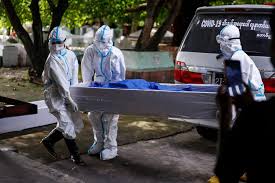
Senior nursing and medical leaders have called for war crimes targeting health workers, patients, and medical facilities to be prioritised for international criminal prosecution.
According to a new report from the Royal College of Nursing’s (RCN) International Nursing Academy, the number of health workers killed in conflicts has increased fivefold in less than a decade. Using verified data from Insecurity Insight, the report shows that 175 health workers were killed in 2016, compared with 932 in 2024.
The figures are expected to rise as data continues to be verified, for instance, reported deaths of health workers in Palestine during 2023 increased from 143 to 414 as records were updated.
RCN general secretary and chief executive, Professor Nicola Ranger, described the figures as “entirely abhorrent.”
“Any killing of any member of nursing staff, in any context or for any reason, is wholly unacceptable,” she said. “The UK government must do everything in its power to uphold international law, including fully supporting the International Criminal Court to investigate and prosecute those responsible.”
The British Medical Association (BMA) has echoed the call. Dr Andrew Green, chair of the BMA’s ethics committee, said:
“When states or armed groups violate international humanitarian law by attacking the wounded, the sick, or those caring for them, they must be held to account. Governments worldwide — including our own — have a crucial role in ensuring justice.”
Professor Ranger warned that attacks on health systems leave “deep and lasting scars” on communities, compounding the suffering of civilians and undermining already fragile health infrastructures. She also urged the UK government to restore overseas aid spending to 0.7% of GDP to help rebuild devastated health systems worldwide.
The report notes that conflict-related deaths in Palestine, Ukraine, and Lebanon have driven a sharp rise in global health worker casualties. Alongside the killings, there has been an alarming surge in arrests and attacks on medical facilities.
Insecurity Insight has already recorded more than 1,200 attacks on health workers so far this year, a number expected to grow as delayed reports are verified.



